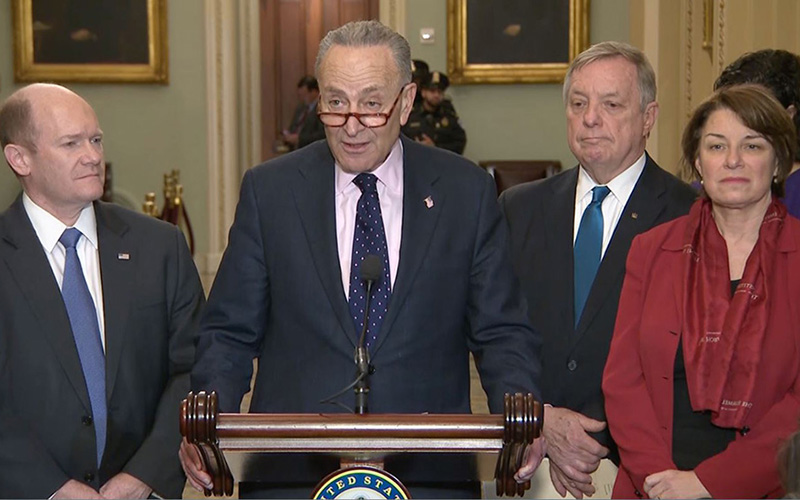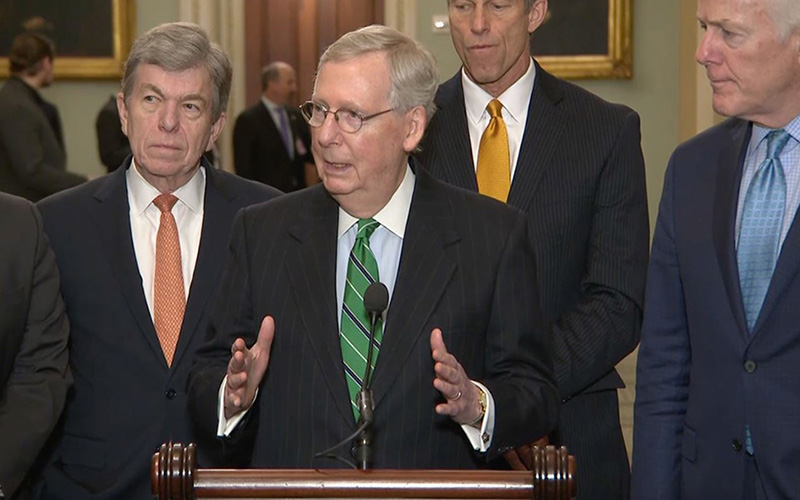WASHINGTON – Sen. Jeff Flake, R-Arizona, said Tuesday the Senate should begin its long-awaited debate on immigration reform by taking up any one of a number of bipartisan bills proposed to see if it “has legs.”
The Senate has plenty of options, and not much time, as it begins the debate with less than three weeks until the current Deferred Action for Childhood Arrivals program expires. And Senate leaders said they expect to move on to other topics after Friday.
“There is no reason in the world why if there is a core 60 votes to support something we can’t achieve that in the next few days,” Senate Majority Leader Mitch McConnell said Tuesday.
But at least one expert doesn’t think it will be so easy to get a DACA solution down in the time allotted.
“I certainly am not willing to place a bet in favor of immigration reform happening this week,” said David Bier, an immigration policy analyst for the Cato Institute, who said lawmakers will need a level of compromise that has been rare in Washington.
This week has been a long time coming. Years of unsuccessful immigration reform efforts got a jolt in September when President Donald Trump announced his plan to rescind DACA – which protects as many as 800,000 young immigrants from deportation – by March 5.
Lawmakers from both parties have been pushing measures since to protect DACA recipients, immigrants who were brought to this country illegally as children. But those measures have gone nowhere.
Senate Democrats in January refused to back a budget extension, leading to a three-day government shutdown, until they got a pledge from McConnell to allow the issue to come to the floor.
Plans range from President Donald Trump’s – to fund a border wall and cut family migration, while giving up to 1.8 million Dreamers a path to citizenship – to a bill by Sens. John McCain, R-Arizona, and Christopher Coons, D-Delaware, that would formalize DACA while funding more border security, but no wall.
-Cronkite News video by Austen Bundy
Flake has his own bill that he plans to introduce, which closely follows Trump’s – providing a 12-year path to citizenship for Dreamers and $25 billion for a border wall – but does not decrease legal immigration numbers.
The McCain-Coons bill mirrors a bipartisan House measure. They would provide DACA protections to any immigrant who was brought to this country illegally as a child and who has been here continually since 2013, a larger pool of people than the 1.8 million proposed in Flake’s or the president’s plan.
Once debate starts, most agree compromise will be necessary to get a bill passed before Friday.
“Our focus is getting to 60, that’s going to take a lot of push and pull a lot of compromise,” Senate Minority Leader Chuck Schumer said Tuesday. “No one is going to get what they want.
“If we can come up with a bipartisan compromise that looks like it’s right in the ballpark of 60 (votes), let it rip, let’s go,” Schumer said.
Flake agrees and hopes the Senate can come to an acceptable bipartisan solution.
“What we’re really trying to do is see if this bipartisan proposal has legs because that has the most Democratic support,” Flake said.
Bier said a deal is possible, but that “if there is a deal that passes the Senate it’s certainly going to involve Sen. Flake” and other moderate Republicans willing to compromise.
Despite both sides saying they want speedy action on DACA, debate was stalled before it even got started Tuesday, when Senate Democrats objected to McConnell’s proposal to begin with an amendment about sanctuary cities.
“The proposal he (McConnell) just offered does not address the underlying issues of this debate, why we’re here,” Schumer said on the Senate floor.
But McConnell said the Democrats were blocking a customary procedure he wanted to use to start the debate on DACA.
“I sought to lay down an amendment … that suggested that we start going back and forth, which is custom when you do a bill in an open process,” he said, only to have Democrats refuse to yield their time and allow debate to start.
Bier predicted before debate began Tuesday that it would rough going.
“It certainly seems as if the parties are still pretty far apart,” on immigration reform, he said.
-Cronkite News reporter Austen Bundy contributed to this report.
Connect with us on Facebook.

